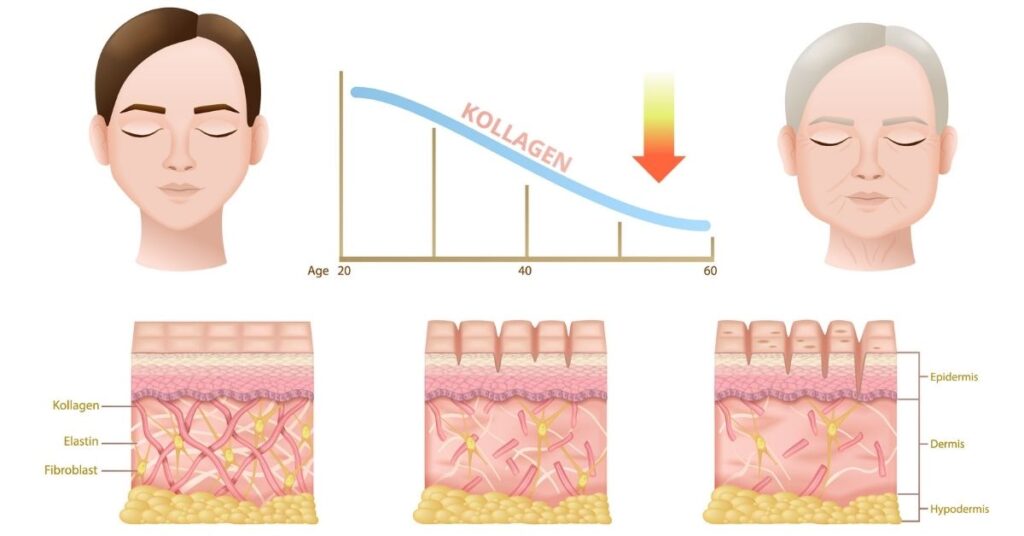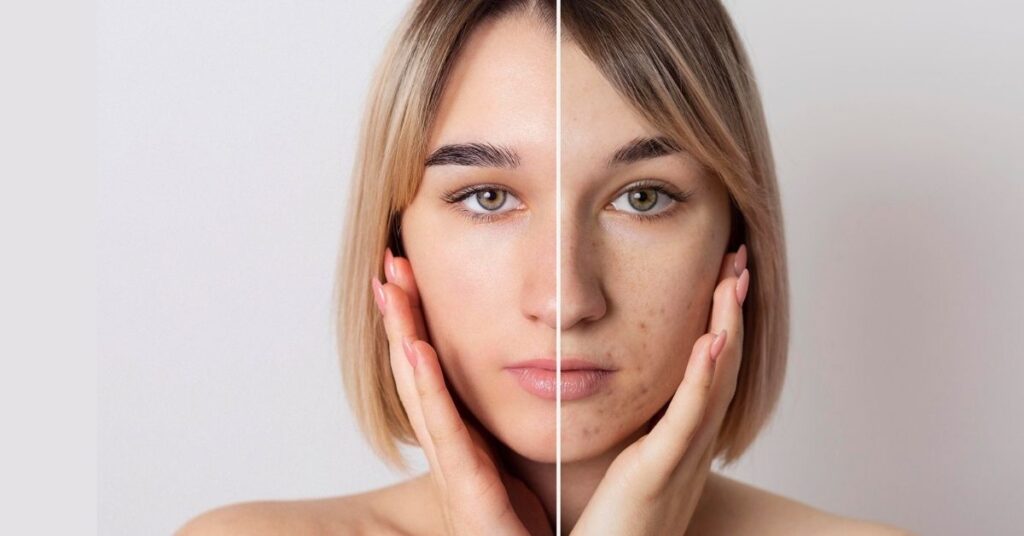
Green tea, a beverage celebrated for its numerous health benefits, isn’t just a delightful drink; it’s a secret weapon for radiant Skin. This article delves into the incredible world of the “benefits of green tea for skin” and explores how this natural powerhouse can transform your skincare routine.
What is Green Tea?
Green tea, derived from Camellia sinensis leaves, has been a staple in traditional medicine for centuries. Packed with antioxidants and other essential nutrients, green tea extends its therapeutic touch beyond internal health to the very fabric of your Skin.
The Benefits of Green Tea for Skin
As we navigate the intricate landscape of skincare, the benefits of green tea emerge as a beacon of hope. From anti-aging effects to acne control, the potential of green tea for skin health is vast and impressive.
1. The Nutritional Powerhouse of Green Tea

Green tea is renowned for its exceptional content of antioxidants, mainly catechins and polyphenols. These antioxidants are crucial defenders against free radicals, unstable molecules that can cause damage to cells. In the context of skin health, understanding the role of these antioxidants is key.
A. Antioxidants in Green Tea:
Catechins and polyphenols are potent antioxidants found in green tea. Antioxidants are substances that counteract the damaging effects of free radicals. Free radicals are produced in the body due to various factors, including exposure to pollution, UV radiation, and even normal metabolic processes. When left unchecked, free radicals can wreak havoc on cells, leading to oxidative stress, a process linked to premature aging and various health issues.
Green tea’s abundant antioxidants, mainly catechins like epigallocatechin gallate (EGCG), act as a defense mechanism. These antioxidants neutralize free radicals by donating electrons, preventing them from causing cellular damage. This process is essential in maintaining the integrity of skin cells and preventing oxidative stress-related skin problems.
B. Antioxidants Role in Skin Health:
The antioxidants present in green tea play a pivotal role in ensuring optimal skin health. Here’s how:
- Neutralizing Harmful Elements: As mentioned, antioxidants in green tea neutralize harmful free radicals. Doing so protects skin cells from damage, helping maintain a healthy and resilient complexion.
- Promoting a Natural Glow: Beyond mere protection, antioxidants contribute to the Skin’s radiance. By preserving the health of skin cells, antioxidants enhance the Skin’s natural glow, providing a vibrant and youthful appearance.
- Supporting Overall Skin Vitality: The cumulative effect of green tea antioxidants goes beyond surface-level benefits. Green tea supports overall skin vitality by safeguarding skin cells and promoting a healthy cellular environment. This can translate to improved elasticity, texture, and tone.
In essence, the antioxidants in green tea act as guardians for your Skin. They counteract the damaging effects of external and internal factors, ensuring your Skin stays protected. It thrives with a natural, healthy glow. Regular incorporation of green tea into your skincare routine can be a proactive step in maintaining and enhancing the vitality of your Skin.
2. Green Tea and Skin Hydration

A. Green Tea Moisturizing Properties:
Green tea stands out as a natural hydrator with exceptional moisturizing properties. Unlike some harsh chemical-based skincare products that may strip the skin of its natural oils, green tea works harmoniously with your skin to provide hydration without the risk of dryness.
The moisturizing prowess of green tea can be attributed to its composition, which includes polyphenols and other bioactive compounds. These elements help to lock in moisture, creating a protective barrier that prevents excessive water loss from the skin. This mainly benefits individuals with dry skin, as green tea offers a gentle and effective solution.
In addition to its hydrating qualities, green tea’s natural origins make it a favorable choice for those looking to avoid synthetic or potentially irritating ingredients commonly found in conventional skincare products. The result is a refreshing and nourishing experience that leaves your skin feeling revitalized and well-hydrated.
B. Preventing Dryness and Flakiness:
Regularly incorporating green tea-infused skincare products into your routine can be a game-changer in the battle against dryness and flakiness. Here’s how:
- Soothing Irritation: Green tea possesses anti-inflammatory properties that can soothe irritated skin, a common factor contributing to dryness. By calming inflammation, it helps create an environment conducive to optimal hydration.
- Balancing Moisture Levels: Green tea balances the skin’s moisture levels. For individuals experiencing fluctuations in hydration, green tea acts as a stabilizing agent, preventing the skin from becoming excessively dry or overly oily.
- Nourishing the Skin Barrier: The moisturizing benefits of green tea extend to enhancing the skin barrier. A strengthened skin barrier is better equipped to retain moisture, promoting long-lasting hydration and reducing the likelihood of flakiness.
In essence, the regular use of green tea-infused skincare products provides a dual-action approach: it addresses existing dryness while proactively preventing its recurrence. Whether you have naturally dry skin or are combating seasonal changes, integrating green tea into your skincare regimen can be a refreshing and practical step toward maintaining supple, soft, and well-hydrated skin.
3. Green Tea For Anti Aging

A. Reduction of Wrinkles:
Green tea emerges as a remarkable ally in the pursuit of youthful and vibrant skin, primarily due to its notable ability to reduce the appearance of wrinkles. This anti-aging effect is attributed to the powerful antioxidants found in green tea, particularly catechins like epigallocatechin gallate (EGCG).
Wrinkles, often associated with aging, result from various factors, including the breakdown of collagen and exposure to environmental stressors. Green tea’s antioxidants combat these processes by neutralizing free radicals, the culprits behind premature aging. By doing so, green tea helps to diminish the signs of aging, including fine lines and wrinkles.
Regularly using green tea-infused skincare products or including green tea in your beauty routine can contribute to a smoother and more youthful complexion. The antioxidants in green tea work synergistically to provide a protective shield against oxidative stress that can accelerate aging, offering a natural and effective solution for reducing wrinkles.
B. Boosting Collagen Production:
Collagen, a crucial protein in the skin, is responsible for maintaining its elasticity and firmness. Green tea’s contribution to anti-aging extends beyond surface-level benefits—it stimulates collagen production, a key factor in promoting skin resilience.
The process begins with the antioxidants in green tea activating certain enzymes that play a role in collagen synthesis. As a result, the production of collagen is enhanced, leading to improvements in skin texture and firmness. This boost in collagen levels contributes to a more youthful appearance by reducing sagging and promoting skin elasticity.
Incorporating green tea into your skincare routine provides a proactive approach to addressing the root causes of aging. Rather than merely treating the visible signs, such as wrinkles, green tea works at a cellular level to support the skin’s natural mechanisms. The result is firmer, more resilient skin that reflects a vitality often associated with youth. You embrace a holistic and effective strategy for maintaining a youthful and radiant complexion by choosing green tea as part of your anti-aging arsenal.
4. Benefits of Green tea for Skin Acne and Blemishes

A. Anti-Inflammatory Properties:
Green tea’s impressive anti-inflammatory properties position it as a valuable ally in the battle against acne. Inflammation is a key factor in developing and exacerbating acne, leading to redness, swelling, and discomfort. Green tea, rich in antioxidants, specifically catechins, can soothe inflamed Skin.
The anti-inflammatory nature of green tea works by calming the Skin and alleviating the redness associated with acne. Catechins, particularly epigallocatechin gallate (EGCG), are crucial in reducing inflammation. This soothing effect immediately relieves irritated Skin and creates an environment conducive to healing.
When incorporated into your skincare routine, green tea-infused products or topical applications can help manage inflammatory responses, addressing one of the root causes of acne. This natural approach contrasts harsher, chemical-laden alternatives, offering a gentler solution for those seeking relief from acne-related inflammation.
B. Reduction of Acne and Blemishes:
Beyond its anti-inflammatory prowess, green tea’s potential to reduce acne and blemishes makes it a sought-after natural solution for clearer Skin. The mechanisms behind this reduction are multifaceted, combining the antioxidant properties of green tea with its ability to regulate sebum production.
- Regulating Sebum Production: Green tea helps balance sebum production, the Skin’s oily substance. Excessive sebum can contribute to clogged pores and acne. By regulating sebum, green tea assists in preventing the formation of new acne lesions.
- Antibacterial Effects: Green tea exhibits antibacterial properties that can combat the bacteria associated with acne, particularly Propionibacterium acnes. This antibacterial action contributes to a reduction in the occurrence of new blemishes.
- Enhancing Skin Healing: The antioxidants in green tea support the Skin’s natural healing processes. This not only aids in recovering existing blemishes but also minimizes the likelihood of scarring.
Incorporating green tea into your skincare routine offers a holistic approach to acne management. Applying green tea-infused products provides a natural and effective strategy for achieving more transparent, healthier Skin, whether in cleansers, toners, or masks. Regular use may unveil a complexion that looks clearer and feels revitalized and well-nourished, thanks to the inherent benefits of green tea.
5. How Green tea act as a Sun Protection

A. UV Damage Prevention:
Green tea, renowned for its versatile benefits, extends its protective qualities to include some defense against UV damage. It’s important to note that while green tea can offer additional protection, it is not a substitute for sunscreen—the primary safeguard against harmful UV rays.
Green tea’s protection is attributed to its rich antioxidant content, particularly catechins. When applied topically, these antioxidants act as a secondary barrier against UV radiation. They function by neutralizing free radicals generated by UV exposure, thus minimizing the oxidative stress that can lead to premature aging and other skin issues.
While green tea’s UV protection is a valuable addition to your skincare routine, it should be viewed as a supplementary measure rather than a standalone defense. Applying a broad-spectrum sunscreen remains imperative for comprehensive protection, especially during prolonged sun exposure.
B. Complementing Sunscreen:
To maximize your defense against harmful UV rays, consider combining green tea-infused products with the application of sunscreen. This dual approach offers a comprehensive shield, addressing green tea’s antioxidant protection and sunscreen’s UV-filtering capabilities.
- Enhanced Antioxidant Defense: Green tea’s antioxidants work synergistically with sunscreen to reinforce your skin’s defense mechanisms. The combined action helps neutralize free radicals and reduce oxidative stress, preventing sun-related damage.
- Boosting Sunscreen Efficacy: Applying green tea-infused products before sunscreen can enhance the latter’s effectiveness. Green tea primes the skin, creating an environment that optimizes the absorption and distribution of sunscreen, ensuring more even and reliable coverage.
- Post-Sun Exposure Soothing: Green tea’s anti-inflammatory properties can also offer soothing relief after sun exposure. Applying green tea-infused products, post-sun can help mitigate inflammation and redness, promoting skin recovery.
In conclusion, incorporating green tea into your skincare routine protects against UV damage. However, it should be viewed as a complementary strategy to sunscreen, not a replacement. Combining green tea-infused products with regular sunscreen application creates a synergistic approach that promotes optimal skin health and protection against the adverse effects of sun exposure.
6. How Green tea Gives Soothing Sensitivity to Skin

A. Calming Irritated Skin:
For individuals grappling with sensitive skin, the soothing properties of green tea emerge as a gentle remedy. Green tea’s natural composition, rich in antioxidants and anti-inflammatory compounds, is particularly effective in calming irritated skin.
Sensitive skin often reacts to environmental factors, leading to redness, itching, and discomfort. Green tea, when applied topically, works to alleviate these symptoms. The antioxidants, notably catechins like epigallocatechin gallate (EGCG), are pivotal in neutralizing irritants and reducing inflammation. This calming effect provides immediate relief, making green tea an excellent choice for skin-sensitive patients.
Regularly using green tea-infused skincare products or a green tea toner can become a soothing ritual for individuals with sensitive skin. The gentle nature of green tea ensures that the skin is nurtured without harsh reactions, offering a natural solution to alleviate irritation and redness.
B. Suitable for Sensitive Skin:
Green tea’s inherent gentleness positions it as a suitable and comforting option for individuals with sensitive skin. The following factors contribute to its compatibility with sensitive skin:
- Minimal Irritants: Green tea formulations, mainly those free from additional fragrances and harsh chemicals, minimize the risk of triggering adverse reactions. This makes green tea a safe choice for those prone to sensitivity concerns.
- Anti-Inflammatory Action: The anti-inflammatory nature of green tea is especially beneficial for sensitive skin. By calming the skin and reducing inflammation, green tea provides relief without exacerbating sensitivity issues.
- Hydration without Heavy Residues: Green tea’s moisturizing properties hydrate the skin without leaving heavy residues. This ensures that sensitive skin receives nourishment without feeling weighed down or greasy.
Choosing green tea for sensitive skin is not just a practical solution; it’s a holistic approach to skincare that prioritizes gentle yet effective care. By harnessing green tea’s calming and nurturing properties, individuals with sensitive skin can embrace a skincare routine that provides relief, comfort, and the benefits of nature’s soothing touch.
Research Findings on Green Tea and Skin Health

A. Studies Supporting Benefits:
Scientific studies consistently support the positive effects of green tea on skin health. Researchers explore how green tea, with its antioxidants like catechins, influences biological processes that maintain skin health. These processes include combating oxidative stress, addressing inflammation, and promoting collagen synthesis. The findings from these studies provide a solid foundation, backed by rigorous research, beyond mere marketing claims. This scientific validation builds confidence in the credibility of green tea’s benefits for the skin at a cellular level.
B. Scientific Evidence:
The support for green tea’s benefits extends beyond theoretical studies, reaching into the realm of concrete scientific evidence. From laboratory experiments to clinical trials involving human participants, the evidence backing the positive impact of green tea on skin health is substantial.
- Laboratory Experiments: In controlled laboratory settings, researchers conduct experiments to elucidate the biochemical and cellular processes influenced by green tea. These experiments often involve cell cultures or animal models, providing insights into the potential therapeutic mechanisms of green tea.
- Clinical Trials: Human clinical trials form a crucial aspect of the scientific evidence supporting green tea’s benefits for the skin. These trials involve real people, and the results provide valuable information about green tea’s practical and tangible effects on diverse skin types and conditions.
The scientific evidence derived from these experiments and trials is a reliable basis for understanding how green tea can be harnessed for optimal skin health. This evidence empowers individuals to make informed decisions about incorporating green tea into their skincare regimen, knowing that its benefits are not merely anecdotal but rooted in rigorous scientific exploration.
Green Tea Side Effects for Skin

A. Allergic Reactions:
Although rare, it’s essential to acknowledge the potential for allergic reactions to green tea in some individuals. Allergic responses can manifest in various ways, including redness, itching, swelling, or rash. To mitigate the risk of an adverse reaction, conducting a patch test before widespread use is advisable.
To perform a patch test:
- Apply a small amount of the green tea to a discreet area of your skin, such as the inner forearm.
- Wait 24 to 48 hours and observe for any signs of irritation or allergic reaction.
- The product is likely safe for broader use if no adverse effects occur during this period.
This precautionary measure allows individuals to assess their skin’s compatibility with green tea, minimizing the risk of unexpected reactions. If an allergic response does occur, discontinuing use is recommended, and consulting a healthcare professional is advised.
B. Sensitivity Concerns:
For individuals with extreme skin sensitivity, exercising caution when incorporating green tea into their skincare routine is paramount. While green tea is generally well-tolerated, those with heightened sensitivity may still experience adverse effects.
Consulting with a dermatologist before introducing green tea-infused products is advisable for sensitive individuals. Dermatologists can provide personalized recommendations based on an individual’s skin type, existing conditions, and potential sensitivities. This proactive approach ensures that individuals with specific skin sensitivities receive tailored guidance, minimizing the risk of adverse reactions and maximizing the benefits of green tea for their unique skincare needs.
In summary, while green tea is celebrated for its numerous benefits, it is crucial to acknowledge the potential for allergic reactions and sensitivity concerns. Implementing patch tests and seeking professional advice in advance contribute to a safer and more effective integration of green tea into one’s skincare routine.
Conclusion
The benefits of green tea for skin are multifaceted, ranging from anti-aging effects to acne control. Its natural properties make it a versatile and effective addition to any skincare routine. As you embark on your journey to healthier skin, consider integrating green tea into your routine. Embrace the simplicity and potency of this natural remedy for a radiant and revitalized complexion.
Frequently Asked Questions (FAQ’s)
1. How Often Should I Use Green Tea on My Skin?
Consistency is key. Incorporate green tea into your daily skincare routine for optimal results.
2. Can Green Tea Help with Severe Skin Conditions?
While green tea offers benefits, individuals with severe skin conditions should consult a dermatologist for personalized advice.
3. Are There Any Age Restrictions for Using Green Tea on the Skin?
Green tea is suitable for all ages. However, individuals with specific concerns should seek professional guidance.
4. What’s the Difference Between Green Tea Extract and Green Tea Oil for the Skin?
Green tea extract is water-based and lighter, while green tea oil is more concentrated. Choose based on your skin type and preferences.
5. Can Pregnant Women Use Green Tea Skincare Products?
Pregnant women should consult their healthcare provider before incorporating new skincare products, including those with green tea.

